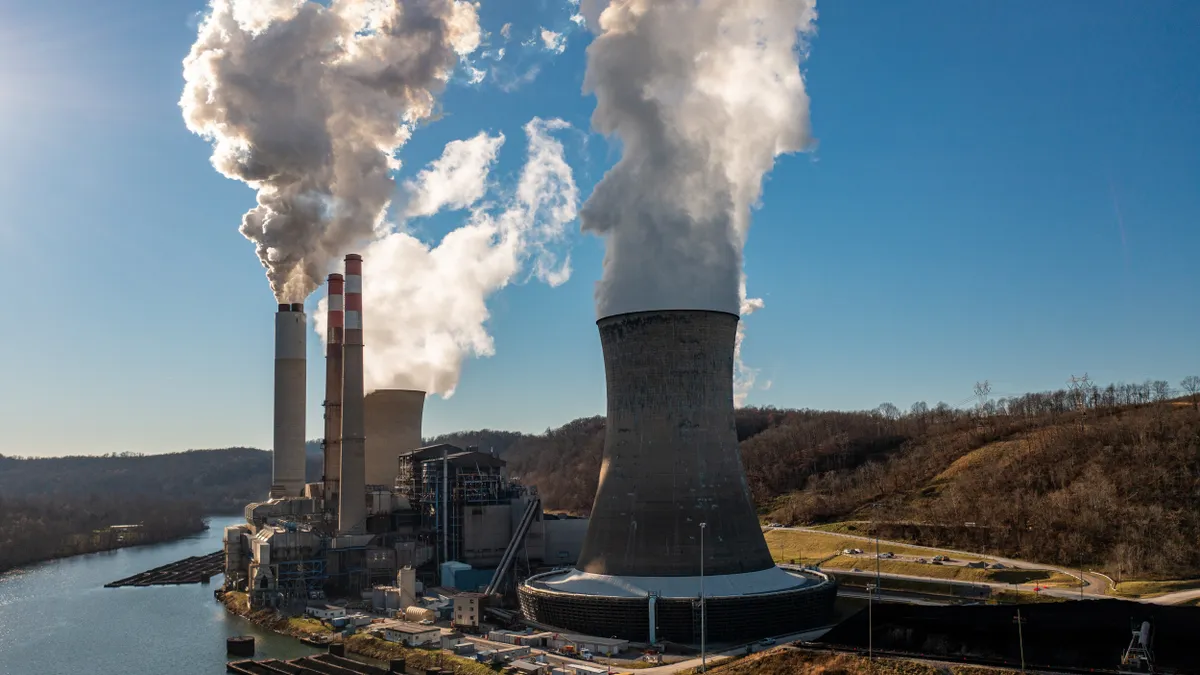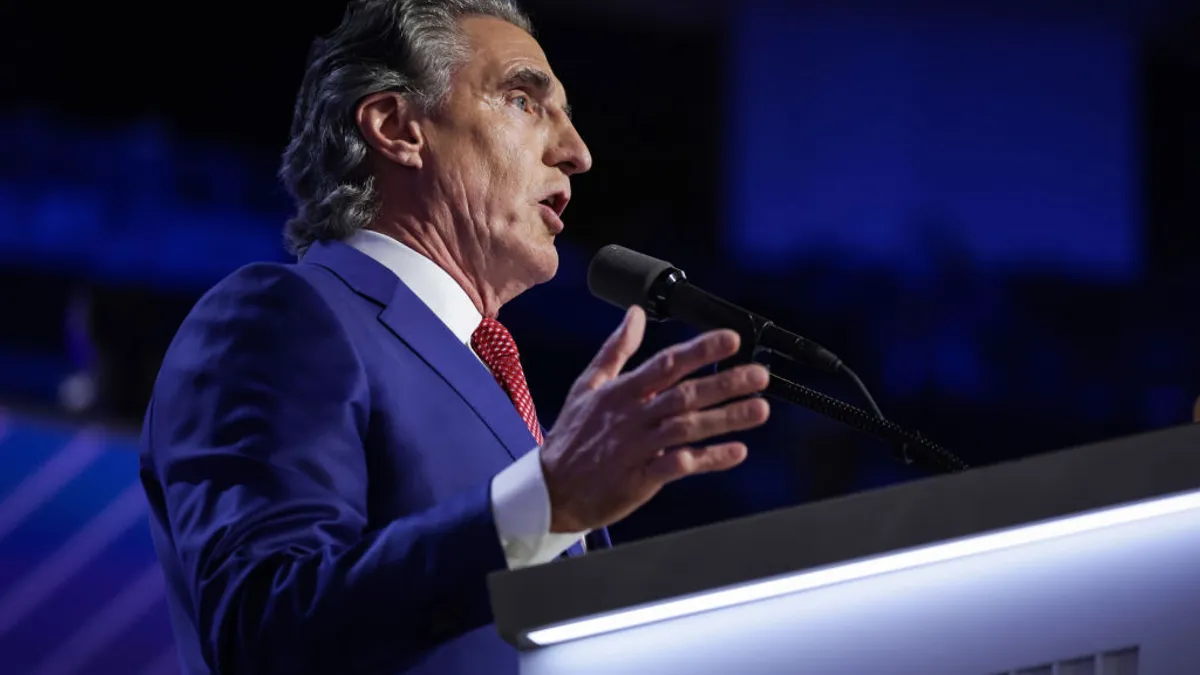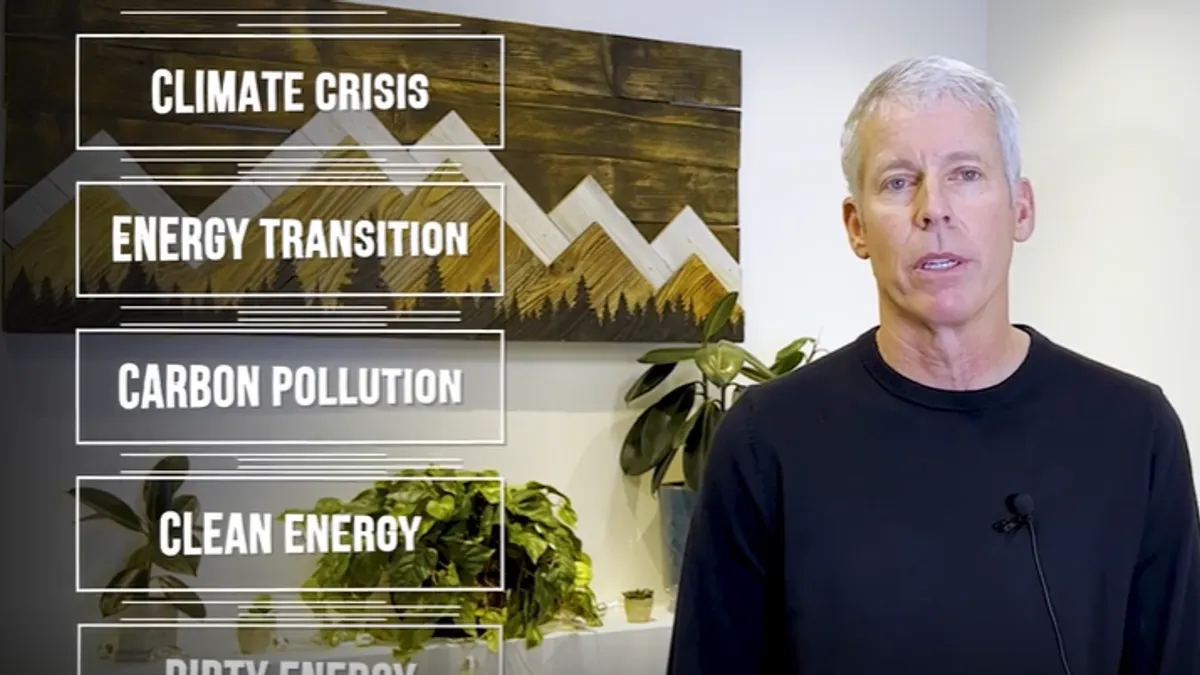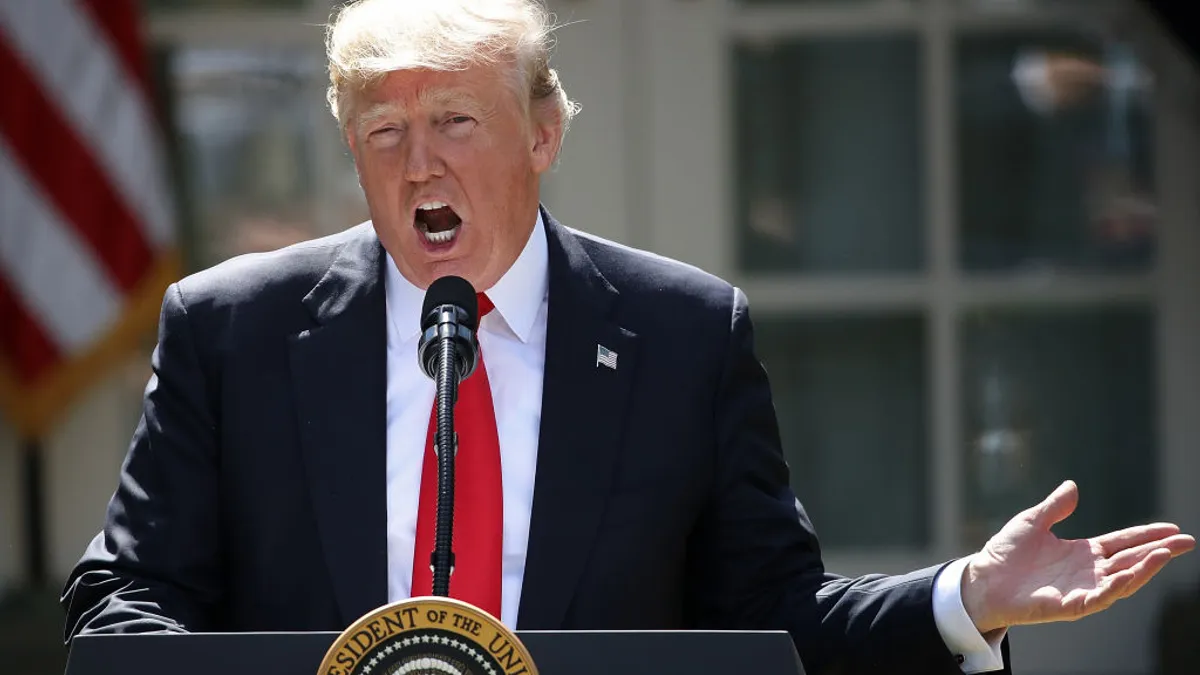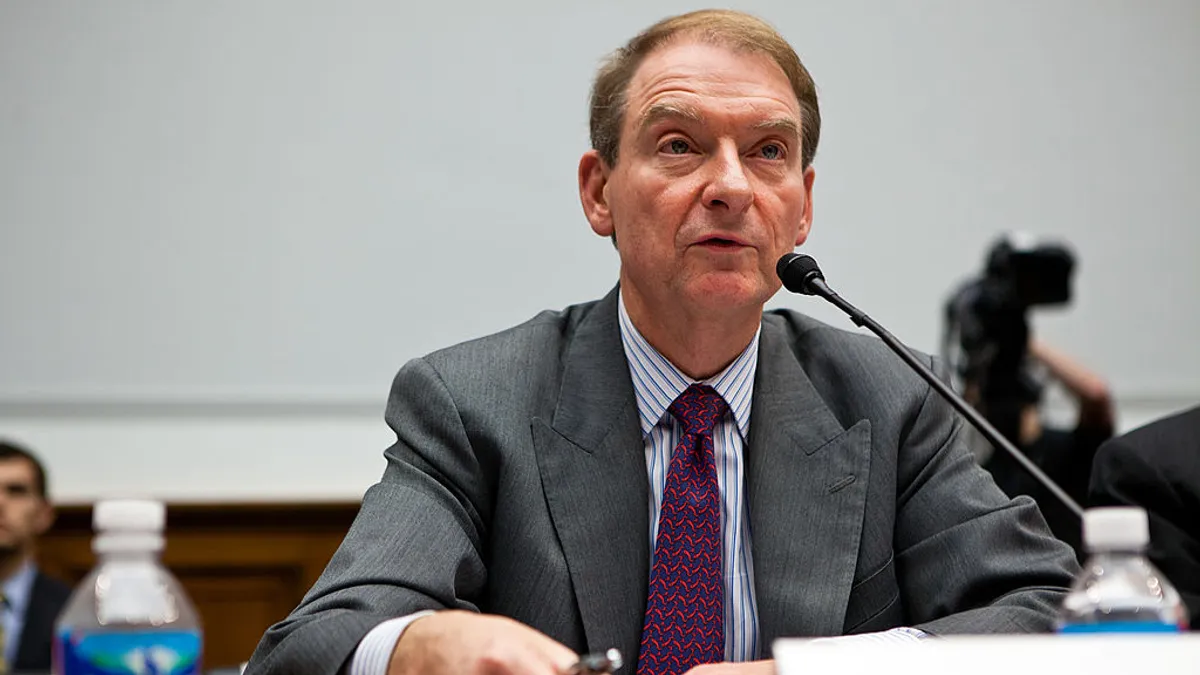This is part of Utility Dive’s ongoing “FERC in Focus” series where we explore trends, challenges and other significant developments affecting the commission.
The Federal Energy Regulatory Commission and key agency-related issues such as electric transmission and natural gas policy could be set in different trajectories depending on the outcome of the Nov. 5 elections, according to former FERC chairmen and other commission experts.
Whoever wins the White House — Vice President Kamala Harris or former President Donald Trump — will be able to decide who runs FERC as soon as they are sworn in.
The FERC chair plays a major role in determining the agenda for the commission — what's voted on and what the staff spend their time on, according to Richard Glick, GQS New Energy Strategies principal and former FERC chairman. FERC Chairman Willie Phillips, a Democrat, has set transmission, reliability and affordability as top priorities. But if Trump wins and appoints a different chair, that chair could set a new agenda for the commission, he said.
However, even if Trump is elected again and selects a new leader at FERC, Democrats could have a majority among the agency’s five commissioners for at least a year and a half, according to Timothy Fox, a managing director for research firm ClearView Energy Partners.
The confirmation of three new FERC commissioners in June — Judy Chang and David Rosner, both Democrats, and Lindsay See, a Republican — could ensure a Democratic majority, Fox said. A president can immediately designate a new chairman from among the sitting commissioners, but Commissioner Mark Christie, a Republican, has a term set to expire on June 30 and Phillips could continue as a commissioner, if not necessarily chair, until mid-2026 at least, unless he left the agency voluntarily, Fox said.
If Harris wins, she could pick a new leader for FERC, according to William Scherman, a partner at Vinson & Elkins and former FERC general counsel. However, “there's a very high likelihood that if Kamala Harris would win that Chairman Phillips would stay on for some period of time, because I think he has been widely recognized on both sides of the aisle for doing a good job and trying to forge bipartisan consensus,” he said.
The three newly seated commissioners likely means FERC will have a period of stability regardless of the election’s outcome, according to Neil Chatterjee, a senior advisor at Hogan Lovells and former FERC chairman who was appointed by Trump in 2017. “Largely speaking, I think we're looking at a stable commission,” he said.
Serena Rwejuna, a partner at White & Case, echoed Chatterjee’s assessment. “There are, in reality, limited opportunities for one administration to really have an immediate or a very significant impact after an election,” Rwejuna said. “FERC’s bipartisan nature and the way that the commission is set up, with the rolling terms, does provide for some continuity and limits the opportunity for either politically motivated, or otherwise, drastic changes.”
Chatterjee’s tenure at FERC wasn’t entirely stable. While Chatterjee was chairman in the early months of the Trump administration, he backed a Department of Energy proposal that aimed to support struggling coal-fired and nuclear power plants. Ultimately, Chatterjee joined other FERC commissioners in unanimously voting against the plan.
Chatterjee now sees that support as a mistake and a reflection of his shift from having an advocacy role in his previous job as an aide to then-Senate Majority Leader Mitch McConnell, R-Ky. “It was me and my own inability to transition from being a partisan legislative aide to an independent regulator that led to that,” Chatterjee said. “There wasn't any sort of undue pressure from the Trump administration.”
A second Trump administration could try to do something similar again, such as give a preference to gas-fired generation, according to Glick. “But, as was demonstrated in 2017, an administration can propose a new policy at FERC, but the commissioners need to separately decide whether that proposed policy is legal and reasonable,” he said.
Also, the day after Trump lost the 2020 election, he ousted Chatterjee as chairman. “It's ostensibly tied to some of the things I did in terms of advancing rules to promote aggregated distributed energy resources and the like that may be perceived as green, but … I think that only happened because after the election, there was no adult supervision,” he said.
Project 2025 calls for FERC changes
Potential policy shifts that could affect FERC under a Trump administration are outlined by Project 2025, a presidential transition effort organized by the conservative Heritage Foundation that includes the Mandate for Leadership, a road map to “deconstruct the Administrative State.” Bernard McNamee, a McGuireWoods partner and former FERC commissioner appointed by Trump, wrote the policy guide’s chapter on the Department of Energy, the Nuclear Regulatory Commission and FERC.
If the commission were to adopt those recommended policies, it would shift FERC’s stances on issues such as power markets, renewable energy and transmission, according to Glick.
The policy guide calls for FERC to direct grid operators to establish “reliability pricing” for dispatchable generating resources or require intermittent resources like wind and solar to buy backup power for when they are not producing electricity.
The policy road map suggests that FERC ensure that wholesale power market pricing mechanisms support generators that need to contract for firm natural gas service and reform market rules that allegedly discriminate against dispatchable resources needed for reliability.
FERC should limit its decision-making on natural gas pipeline permits to whether the gas is needed and the agency should restrict its environmental analysis to the direct effects of the pipeline itself, and not its indirect upstream and downstream greenhouse gas effects, according to the policy road map.
In moves that could indirectly affect FERC, the policy road map calls for Congress to eliminate subsidies for generating resources, end energy efficiency appliance standards and repeal the Infrastructure Investment and Jobs Act and the Inflation Reduction Act.
The Project 2025 policy guide calls for adopting the Trump administration’s Schedule F classification for career federal employees involved in policymaking. The personnel classification would allow the president to fire those employees and replace them with selected people. In response to an October 2020 Trump executive order establishing Schedule F, FERC estimated that more than half of its positions met Schedule F criteria, according to a 2022 Government Accountability Office report.
If a Trump administration makes a second attempt at adopting a Schedule F program, federal employees fearing they will lose their jobs could leave agencies and cause a “brain drain,” according to Glick. “That's a concern because you don't want to lose good people that are hardworking federal civil servants, such as the amazing FERC staff, that didn’t come to their jobs to pursue one administration's agenda or the other,” he said.
Trump has tried to distance himself from Project 2025.
Impact on transmission, gas policy
Potentially, the most significant FERC-related policy areas that could be affected by the elections are the agency’s process for reviewing natural gas infrastructure projects and transmission planning and cost allocation.
FERC’s Order 1920 may be the biggest issue that could be affected by the elections, according to Rwejuna. With FERC’s Christie issuing a sharp dissent in a 2-1 decision approving the order, the transmission planning and cost allocation rule is being appealed in court, she noted. Also, grid operators are set to file their plans for complying with the order this summer when FERC may still have a Democratic majority, Rwejuna said.
Permitting reform efforts — and giving FERC increased siting authority over transmission lines — could also be affected by the elections, Scherman said. Although permitting reform legislation is pending in Congress, it most likely won’t be tackled until Congress returns next year, he said.
Who controls the Senate?
Congressional elections could also affect FERC. When including three independents, Democrats have a one seat majority in the Senate. Republicans have an eight seat advantage in the House.
If Republicans gain control of the Senate, a Republican would lead the Senate Energy and Natural Resources Committee, which has FERC oversight and votes on nominees for the commissioner’s seats.
The FERC nomination process has become more politicized in recent years, according to Glick. Sen. Joe Manchin, I-W.Va., for example, refused to hold a hearing on Glick’s nomination for a second term at FERC. “The make up of the Senate, in particular the Senate Energy and Natural Resources Committee, can certainly have a big impact on who the next commissioner or set of commissioners will be,” Glick said.
Sen. John Barrasso, R-Wyo., the committee’s ranking member, plans to run for the Senate Republican whip next year, potentially clearing the way for Sen. Mike Lee, R-Utah, to lead the Republicans on the energy panel. Lee suggested that Congress consider abolishing FERC during a March 2022 oversight hearing where the agency’s natural gas policies were discussed.
With Manchin leaving Congress at the end of this term, Sen. Martin Heinrich, D-N.M., would be the senior Democrat on the panel. Heinrich, a co-chair of the Senate Electrification Caucus, last year introduced a bill requiring FERC to order transmission owners to conduct interregional transmission planning.
In 2022, Heinrich and Lee jointly urged FERC to include transmission competition and disallow the right of first refusal for incumbent utilities to build transmission lines as part of the agency’s overhaul of its transmission planning rules.


















